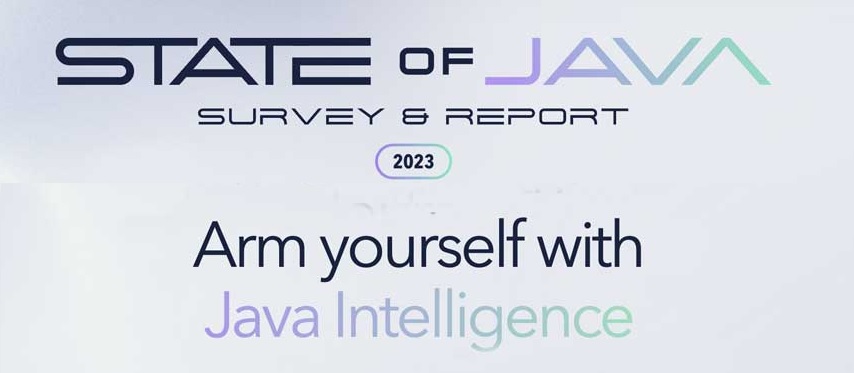Check Point® Software Technologies Ltd.(link is external) announced that its Infinity Platform has been named the top-ranked AI-powered cyber security platform in the 2025 Miercom Assessment.
Azul's State of Java Survey and Report 2023 uncovered several attention-getting results.

Here are our top five takeaways.
1. Java Is Thriving
Survey responders answered a qualifying question to determine whether they could proceed with the survey. Namely, did their organizations use Java for their applications or services? Only 2% were disqualified from taking the survey, meaning 98% use Java, with 57% saying it is the backbone of most of their application and infrastructure estate.
While new languages like Rust, Typescript and Go evolve and gain market share, Java continues to evolve too, and it has remained one of the most popular languages thanks to some critical features:
■ Java is defined collaboratively through the Java Community Process (JCP) and developed under the open-source OpenJDK project.
■ It's updated every six months, and a version is introduced every two years with long-term support.
■ Java-based applications that run on new versions of Java can usually run on older versions, too.
■ Developers need to write only a single code base to execute their program on any operating system and hardware.
Java remains one of the most in-demand coding languages today, and it continues to move into new areas, such as AI.
2. Java Users Are Concerned About Oracle Java SE Pricing
The survey confirms frustration over Oracle Java pricing, as 82% of respondents stated they are concerned about Oracle's fourth major pricing and licensing change in four years.
Looking more closely, 49% of participants are either very concerned or extremely concerned, and only 11% are not at all concerned.
Another factor is whether the pricing change is hitting companies financially. Overall, 66% choose to pay for support. Those who are not concerned are generally not paying for Java support.
■ Among those who do pay for support, 63% are extremely or very concerned, and only 5% are not at all concerned.
■ Of those who don't pay for support, 23% are extremely or very concerned, while 25% are not at all concerned.
3. Users Are Looking at Alternative Java Providers
Java users are going beyond idle chatter, social media posts and blog posts and are taking action. In fact, 72% are actively considering alternatives to Oracle Java SE.
As the percentage of companies using Oracle's JDK drops — from more than 70% in 2020, according to other studies, to 42% in the report — other distributions are growing. In other words, if you're not happy with your current Java SE or OpenJDK provider, you have options.
4. OpenJDK Distributions Give Organizations Choices
The percentage of companies using Oracle Java SE had been dropping already. While 42% of respondents use Oracle Java, very few use Oracle Java exclusively. Only 10% use only Oracle Java, while 32% use Oracle plus another distribution, and 58% don't use Oracle Java at all.
As fewer organizations use Oracle Java, more of them use OpenJDK distributions. In the survey, seven non-Oracle distributions are used by at least 10% of responders (in a multi-select question).
5. Migration Causes Unrealistic Angst
What's preventing organizations from changing Java providers in even greater numbers? Many have an outsized idea of how arduous a migration really is.
In another multi-select question, more than half (52%) say a migration is too much effort (26%), they couldn't find a migration partner (12%), they lack the expertise for other Java distributions (18%), or it never occurred to them that they could change providers (14%).
Migrating to certified builds of OpenJDK can be very straightforward and simple for the vast majority of enterprises. Companies migrating server applications are not likely to encounter any challenges.
Frustration over Oracle's latest Java pricing changes opens opportunities for organizations looking to save on licensing costs and have a better relationship with their Java providers. Options are available for companies looking to make a change. If they do their due diligence and are as prepared as possible when they start, most Java migrations are relatively painless.
Methodology: The report was conducted independently with more than 2,000 Java users of all seniority levels from six continents in May and June 2023.
Industry News
Orca Security announced the Orca Bitbucket App, a cloud-native seamless integration for scanning Bitbucket Repositories.
The Live API for Gemini models is now in Preview, enabling developers to start building and testing more robust, scalable applications with significantly higher rate limits.
Backslash Security(link is external) announced significant adoption of the Backslash App Graph, the industry’s first dynamic digital twin for application code.
SmartBear launched API Hub for Test, a new capability within the company’s API Hub, powered by Swagger.
Akamai Technologies introduced App & API Protector Hybrid.
Veracode has been granted a United States patent for its generative artificial intelligence security tool, Veracode Fix.
Zesty announced that its automated Kubernetes optimization platform, Kompass, now includes full pod scaling capabilities, with the addition of Vertical Pod Autoscaler (VPA) alongside the existing Horizontal Pod Autoscaler (HPA).
Check Point® Software Technologies Ltd.(link is external) has emerged as a leading player in Attack Surface Management (ASM) with its acquisition of Cyberint, as highlighted in the recent GigaOm Radar report.
GitHub announced the general availability of security campaigns with Copilot Autofix to help security and developer teams rapidly reduce security debt across their entire codebase.
DX and Spotify announced a partnership to help engineering organizations achieve higher returns on investment and business impact from their Spotify Portal for Backstage implementation.
Appfire announced its launch of the Appfire Cloud Advantage Alliance.
Salt Security announced API integrations with the CrowdStrike Falcon® platform to enhance and accelerate API discovery, posture governance and threat protection.
Lucid Software has acquired airfocus, an AI-powered product management and roadmapping platform designed to help teams prioritize and build the right products faster.
StackGen has partnered with Google Cloud Platform (GCP) to bring its platform to the Google Cloud Marketplace.













